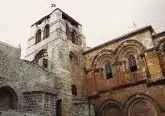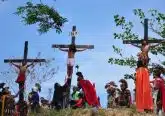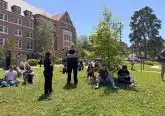Colombian diocese, with some U.S. support, helps flood of Venezuelans

IMAGE: CNS photo/Manuel Rueda
By Manuel Rueda
CUCUTA, Colombia (CNS) — Every weekday before she heads to work, Angelica Tesorero takes her small children to a day care center run by the Diocese of Cucuta.
She hugs the two siblings, kisses them on the cheek and leaves them to a small team of volunteers, who will take care of the children until late in the afternoon.
"This is extremely helpful," said Tesorero, a Venezuelan migrant who arrived in Colombia in December and still does not have a work permit. She ekes out a living by selling pigeon feed and coffee at a busy public square.
"If I take my kids to work with me it could get me in trouble with police," she told Catholic News Service. "So it’s good to leave them here, where they are treated nicely, and also get breakfast and lunch."
The Nina Maria day care center is one of many projects run by the Diocese of Cucuta to help Venezuelan migrants, who are leaving their country to escape poverty, violence and an increasingly authoritarian government.
A small delegation from the U.S. Conference of Catholics Bishops recently visited the center and several more projects on the Colombia-Venezuela border to assess the situation of migrants and refugees and look at ways to help Catholic charities that are working with this vulnerable group.
Auxiliary Bishop Octavio Cisneros of Brooklyn, New York, who headed the USCCB delegation to Cucuta, congratulated the day care center workers for what they have achieved so far.
"A long time ago, I was one of those kids," said Bishop Cisneros, who is originally from Cuba and was raised in an orphanage in Michigan after his parents sent him to the United States as a little boy. "You are providing a very valuable service."
Father Leo Perez, director of the USCCB Collection for the Church in Latin America, said the border is "going through a humanitarian crisis."
"People here need medical care, food, transportation and all kinds of human support," he said.
During its time in Cucuta, the U.S. delegation visited a shelter that houses vulnerable migrants who arrive in Colombia with no money, as well as a food pantry that feeds 6,000 people each day. The shelter received a $50,000 grant from the USCCB in 2018.
The team said it was looking at ways to support more projects that could have a positive impact on the lives of these migrants and refugees and alleviate some of their suffering.
"We hope to reach out more in this region," Father Perez said. "And also in Venezuela. We were able to make some wonderful contacts with Venezuelan bishops, who will send us ideas about areas in which we can help."
The United Nations says more than 4.5 million people have left Venezuela since 2015, seeking shelter from a collapsing economy, violence and political repression.
For many migrants and refugees, their first stop is the Colombian city of Cucuta, located just a few miles from the border.
In this bustling city, opportunistic businessmen offer desperate Venezuelan women $15 for their hair, so they can make wigs that they sell for handsome profits. In commercial districts, migrants work in restaurants and construction sites, sometimes earning half the legal minimum wage. Others beg for money at traffic lights or resort to sex work to make some pesos that they can send to cash-strapped relatives in Venezuela.
To respond to this complex situation, the Catholic Church is attempting to expand projects like a shelter that provides housing to families who arrive in Colombia with small children and no money to spare.
Other church projects in Cucuta focus on training migrants in skills that will help them to find work. At the Luis Variara House, an events complex owned by the diocese, Venezuelan and Colombian women are learning how to sew and design clothes.
"I’m 46 and it’s difficult for me to get hired by companies because of my age," said Tea Escobar, a former Venezuelan government worker whose family struggles to get by. She was learning how to use a sewing machine. "My hope is that I can start a workshop, find clients and turn that into a business."
Kimberley Pachecho, 26, said her income has doubled since she began taking her three children to the Nina Maria day care center. Pacheco sells snacks in the streets and was only working a couple hours a day because she did not have a place to leave her children, ages 7, 5 and 2.
"I would have some neighbors watch over them, go out into the street, make some money to pay rent, and come back home immediately," the Venezuelan migrant said. "Now I can work the whole day and save more money."
The day care center, which takes care of 220 children each day, is helping migrants who have not been able to enroll their kids in school or in state-run day care because they do not have proper documentation, said Father Elver Rojas, its director.
Father Rojas said word about the day care center has spread fast, and he has had to turn down parents because of demand for the service, which is free of charge.
He would like to expand the center so that it can serve twice as many children and also hire full-time staffers who are specialists in child psychology and teaching. But he needs more funding for that. Currently the day care center is run by a staff of three people, as well as a group of about eight volunteers who come in daily to cook and take care of the children.
"The volunteers are a blessing from God," Father Rojas said. "But if we want to expand this service, we also need funding for electricity, gas and water. It’s a challenge to cook for so many children."
– – –
Copyright © 2020 Catholic News Service/U.S. Conference of Catholic Bishops. www.catholicnews.com. All rights reserved. Republishing or redistributing of CNS content, including by framing or similar means without prior permission, is prohibited. You may link to stories on our public site. This copy is for your personal, non-commercial use only. To request permission for republishing or redistributing of CNS content, please contact permissions at [email protected].













